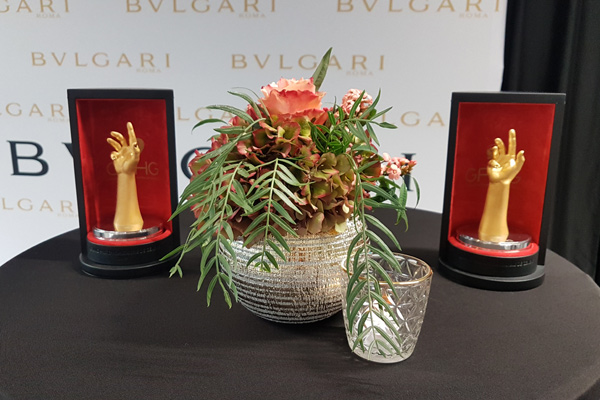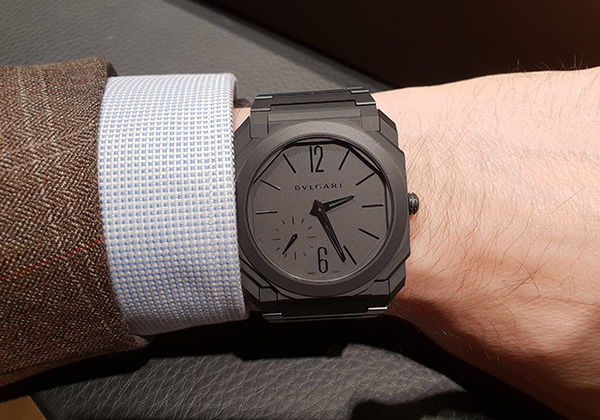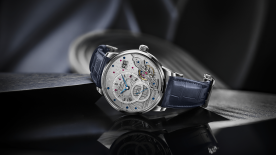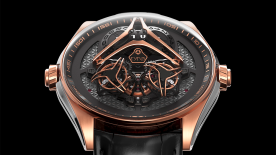WorldTempus met the new director of Bulgari’s watch division at the inauguration of the new manufacture in Saignelégier on 8 November, the day after the awards ceremony for the Grand Prix d’Horlogerie de Genève 2019. Bulgari came away with two prizes: the Chronograph prize for the Octo Finissimo Chronograph GMT Automatic, and the Jewellery Watch prize for the Serpenti Misteriosi Romani.
First of all, congratulations on winning this double distinction at the GPHG. One Serpenti and one Octo – both of Bulgari’s two iconic pillars have been recognised.
Thank you, on behalf of the Maison. I may be one of the recipients but I’m not really one of the main actors, although I accept the congratulations with pleasure. I’m back in Switzerland after several years away, and my last GPHG was 12 years ago. I watched it with new eyes. I liked the fresher, more spontaneous side to the ceremony, and the exuberant and completely unforced reception that Jean-Christophe Babin and his team were given, and which they so richly deserved. Today Bulgari enjoys genuine recognition, both as a jeweller and as a watchmaker. It’s a fine outcome for Bulgari’s watchmaking, which started out 30 years ago; we now have a genuine watchmaking unit that is very strong, very creative, ingenious and powerful.
You said recently that you wanted to raise awareness of your collections. Could the GPHG awards have an impact in this regard?
Their impact is very difficult to measure, because watchmaking is a long-term industry. These are products that aren’t bought very frequently, so the rate at which information is absorbed by the general public is very slow. The GPHG’s window of communication is very small, and will affect customers intending to buy a watch this Christmas. In reality, the GPHG is an important component of a mosaic of information that, over time, determines a brand’s position in a given market and with a given demographic. I’m convinced that the GPHG has a value and an effect in terms of validating people’s choices. Is it a factor in triggering sales? Perhaps. It is a vector of radical change that could lead to an explosion of sales tomorrow? I wouldn’t go that far.

Is it an easy choice for you to take part every year?
Yes, given what I’ve seen this year, and what I have understood about the evolution of the GPHG. I think it’s good for us to take part, for two reasons. On the one hand, it’s an opportunity for the industry to come together, and it’s good to be a part of that. And then, whatever anyone might say, an award encourages excellence. Competition teaches us how to celebrate hard work and accept defeat. “Victory without risk brings triumph without glory.” Last year we didn’t win anything, and that was a disappointment. But that’s part of life, and you have to be able to accept judgement. The day you forget that, you might also begin to forget other judgements, such as those of retailers, and that’s not a good sign. It’s good to take part, even if you lose – although it’s possible I wouldn’t be saying that if we’d had three years with no prizes! (laughs)
You have just taken over as director of the Bulgari Watch Division. What are your immediate priorities?
My first job will be to listen and watch. There is a structure in place, a highly functioning structure – these awards are proof of that – and people who are working in an environment that allows them to perform. You have to understand why it works, and understand the reasons why things improve, in order to be able to adapt to what is working, according to your own personality. I’m joining a moving train, and I have to begin by getting up to speed with the people, in order to get on board with their projects. After that, it will be a matter of continuing to strengthen this area of excellence for which the brand is known – watchmaking innovation, the mechanical aesthetics that are dear to Fabrizio Buonamassa [the designer of Bulgari Watches], the Italian spirit that Bulgari brings to watchmaking; to work on our uniqueness and focus on points of progress.
Are you happy with people’s perception of Bulgari?
The difficulty in our industry is that it’s long-term, even more so where our clients are concerned. It’s very tricky to build an image and establish a product. If you look at the products that have become watch icons over the last 10 or 15 years, there’s maybe the Hublot Big Bang and the Octo, although I don’t think it actually has iconic status. It’s a model that enjoys high recognition, and people do talk about it, but it’s not an icon. It’s hard work to gain recognition for a product. It’s a 10, 15 or 20-year slog. Today, the best-sellers are all iconic models that are 50, 60 or 70 years old. My arrival won’t make any great waves. It would be very arrogant of me to think so, in a sector that requires patience. People say that watches that are 2 or 3 years old are passé. It’s not true. These are new pieces, and there is a huge disconnect in the perception of time in our industry.

If you had to convince a client, whether male or female, to buy a Bulgari watch, what would you say to them?
I’d begin by putting a Bulgari watch on their wrist. A Serpenti is a piece of jewellery you wear on the wrist, and it will naturally make you think about what you’re wearing. When you wear a Serpenti, you want to be noticed. It changes the way you act. Or, in any case, it reveals who you are, it shows an attitude. This goes beyond the product itself, and it’s fascinating. When you wear an Octo Finissimo you’re wearing a piece of 21st-century technological jewellery, the iPhone of watchmaking, a distillation of micro-engineering in an ultra-simple, ultra-fluid form. It’s a product that is as beautiful and simple on the outside as it is complex inside, and after five minutes you forget you’re wearing it.
When you have iconic designs like the Serpenti or the Octo, how do you go about refreshing them? Where do you find your inspiration?
It’s very complicated, because sometimes when you modify a highly refined product, you spoil it. For designers, having to evolve a design is often a source of great anguish, but you have to do it. Every profession has its challenges, and this is one of ours. But at the same time, it’s easier to evolve an icon than to create one. The more I work in this business, the more I value failure, because it’s the signature of humanity. You must give yourself permission to fail with a design, to bring out a product that maybe doesn’t look that great, or which is misunderstood, because our successes are also failures to those people who don’t like our designs.








